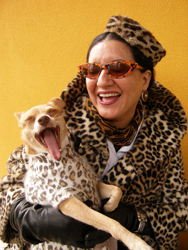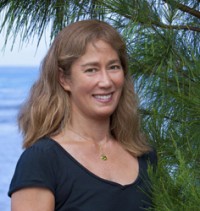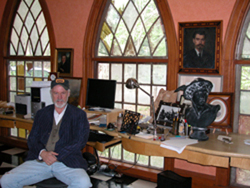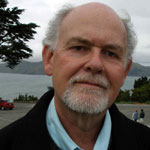TW Review by Fred Setterberg
On Making the Pilgrimage to Iowa City—or Not
We Wanted to be Writers: Life, Love, and Literature at the Iowa Writers’ Workshop by Eric Olsen and Glenn Schaeffer (Skyhorse Publishing, 2011, 320 pages, $16.95 paperback).
Let’s set aside for a moment that clunky old conundrum: Can writing be taught?
We know what the detractors say. Here’s the opening salvo in an otherwise judicious and nuanced piece by the New Yorker’s prized essayist (and unpublished ex-poet) Louis Menand:
Creative-writing programs are designed on the theory that students who have never published a poem can teach other students who have never published a poem how to write a publishable poem.
More positively, the strategically repositioned website of the Iowa Workshop—the Harvard/MIT/Wharton School of writing programs—unabashedly trumpets “our conviction that writing cannot be taught but that writers can be encouraged.”
It’s still not the most ringing endorsement of the proposition. If even the prestigious Iowa Workshop backs away from hyping its success rate, what are we to make of the plethora of degree-granting creative writing programs (more than 800, by my count) that have spread their tendrils across the land?
Are they good for anything? And does Iowa offer more benefits and privileges than its competitors, offshoots, and clones?
“If you throw a lot of talented folks together in one place and give them the freedom to work and play together, not always nicely but nicely often enough, good things are going to happen,” argues Eric Olsen, coauthor of We Wanted to Be Writers, a book that celebrates the Iowa program. “But then this is the case for every workshop class, not just ours.”
True enough. He’s also talking about Irvine, Austin, Las Vegas, San Francisco, and anywhere else offering the basics: dedicated students, not-incompetent teaching, and an ethos of relentless hard work. This book really isn’t about the pros and cons of Iowa itself—at least, not in the revealing ways some readers might want to hear. But the snappy reminiscences and smart, short essays framing each chapter make plain what transpires—or should—within any artistic hothouse where desire meets opportunity.
If I could suggest an alternative and completely unworkable subtitle:
Everything You Should Know About Any Halfway Decent Writing Program
or
What to Expect When You’re Expecting to Fork Over Thousands for Your MFA
Undramatic as that sounds, the answers in We Wanted to Be Writers may surprise you, even thrill you, if you’re a working writer. As Joy Harjo recalls:
Poetry basically took me captive, took pity on me. Poetry basically told me: You don’t know how to listen, you need to learn how to speak, you need to learn grace, and you’re coming with me.
A Who’s Who of Iowa Grads
Authors Eric Olsen and Glenn Schaeffer attended the Iowa Workshop in the mid-1970s. Olsen, the author of six nonfiction books and a former Time Warner magazine editor, got his MFA in 1977. Schaeffer graduated in the same year, spent three decades as a Las Vegas gaming industry executive, and now is the principal owner of a Hollywood literary agency.
Olsen and Schaeffer began their long friendship at the Workshop. In 2000, they founded a literary think tank, now part of the Black Mountain Institute, to “support writers from around the world whose voices are muffled by persecution or censorship.” That’s according to the website for BrightCity Books, another venture Olsen and Schaeffer cofounded (with Dave Hickey) in 2006.
(Disclosure: I know Eric Olsen—not from Iowa, where I’ve yet to set foot, but within the small-town writers’ circles in the San Francisco Bay Area.)
 Over the course of 300-plus pages, Olsen and Schaeffer thresh through the recollections of the Class of ’77 (plus some overlap in either direction) to document the Iowa experience. Beyond chronicling the exploits of their era, they delve into the whys and wherefores of authorial persistence: What propels young writers forward with momentum that lasts?
Over the course of 300-plus pages, Olsen and Schaeffer thresh through the recollections of the Class of ’77 (plus some overlap in either direction) to document the Iowa experience. Beyond chronicling the exploits of their era, they delve into the whys and wherefores of authorial persistence: What propels young writers forward with momentum that lasts?
“Few could point to a moment when they had become, inescapably, a writer,” acknowledges Olsen in his introduction to an early chapter on the writerly urge. “It was more often a drawn-out process of being attracted to the notion and gradually being sucked in.”
He and Schaeffer set forth the insights and gripes of 31 Iowa writers (4 of them faculty members) in meaty paragraphs and page-long musings. Among the classmates they interviewed: T.C. Boyle, Sandra Cisneros, Jennie Fields, Allan Gurganus, Jane Smiley, Michelle Huneven, Jayne Anne Phillips, Douglas Unger—and TV script writer Robin Green, whose combined audience for 22 episodes of The Sopranos and 25 Northern Exposures must surely dwarf the readerships of every other graduate of the Iowa Workshop—maybe every page-making graduate emitted by workshops everywhere and for all time.
What drew students in the first place turns out to be a very mixed bag. Journalist Mindy Pennybacker says:
I applied to Iowa because I adored Flannery O’Connor, and because Columbia never ever responded to my application, and because my mother, who, ahem, got pregnant with me while attending the University of Iowa as an undergrad, took a class at the Workshop from Paul Engle. Her fellow students included Donald Justice, with whom she and my dad played poker and smoked and drank, and all this, of course, crossed the umbilical cord.
It’s the insider stuff about the better-known writers that will attract many readers. Jane Smiley studied Old Norse as a nascent medievalist on her way to writing her novel The Greenlanders. Sandra Cisneros’s family affixed to their dartboard a photograph of Vice President Spiro Agnew.
The poet Marvin Bell, who served on Iowa’s faculty for forty years, counted among his former students “a movie star…a pool hustler, two Zen monks, two professional basketball players, and a former assassin.”

By encouraging these famous and lesser-so graduates to look back (in occasional anger, but mostly fondness), the book traces a common trajectory across seven chapters organized around themes like the compulsion to write and techniques for keeping the work going. The ex-Iowans talk about their predictable childhood infatuation with words and stories, then move on to early scribblings, dutiful study, obsession, production, and the rewards of a literary career.
Or not. The remunerations of poetry, playwriting, and literary fiction being what they are, many grads opted for occupations with deeper pockets: law, high-tech, business—even university teaching, where steadyish employment and benefits trump most book advances and royalty checks.
Indeed, Kurt Vonnegut, an occasional Iowa instructor, declared that among the Workshop’s students “virtually everybody’s going to fail. If you ran a school of pharmacy like that it would be a scandal.”
“I Didn’t Know What the Hell I Was Doing There”
Surely, most students don’t confuse their MFAs with a license to publish. But what does failure or success mean in terms of learning to write within the context of the world’s most famous writing program? Doesn’t the glow of Iowa cast an aura around early work that would have otherwise gone unnoticed?
Might it not attract the phototactic flutter of the editorial and agentry elite?
On this question, We Wanted to Be Writers is largely silent, although a number of writers aver that wherever the action might have been at Iowa, it always seemed to involve somebody other than them. Harjo admits:
I struggled with a chasm of loneliness. The workshop culture was a foreign culture to me. I felt I was an outsider, but I wasn’t the only one. We were all struggling with ourselves in that place and time, which I learned only many years after the fact, when comparing notes with other former students. Even those I had perceived as the insiders carried similar struggles and doubts.
News of this struggle may or may not cheer those with a chip on their shoulders about the Workshop’s pedigree and enduring reputation—“big fat target that it is,” as Olsen puts it. In truth, one of the book’s many charms is the graduates’ admission of Workshop limitations. Here’s T.C. Boyle:
When I was a student, we didn’t know how to handle ourselves. I certainly didn’t know what the hell I was doing there. I didn’t have the vocabulary for talking about other peoples’ work. None of us did. The students now are light years ahead of where we were then. Some of the teachers are, too.
Personally, I can’t fathom why anybody would bother to bristle about the advantages conferred or denied by one grad program or another when there’s the state of publishing, bookstores, dwindling library expenditures, and Amazon to set one’s teeth against.
Back in the 1980s, I attended San Francisco State’s creative writing program (along with TW editors Martha Nichols, Karen Ohlson, and Carol Dorf, by the way). I don’t recall anybody—student or faculty—whinging over their rotten luck to be living in the City by the Bay rather than east-central Iowa. Nor did we worry that it would make much difference when it came to quixotically dedicating our future years to advancing our narrative skills.
“Writing a book is a horrible, exhausting struggle, like a long bout of some painful illness,” admitted George Orwell in his 1946 essay “Why I Write,” a sobering statement. “One would never undertake such a thing if one were not driven on by some demon whom one can neither resist nor understand.”

The devilishness of authorial drive gets thoroughly examined in We Wanted to Be Writers, though there’s scant romantic pessimism about the writer’s troubled lot. No hand wringing or beery sobs to suggest that writing is anything other than a privilege to pursue as a vocation or avocation—particularly in comparison with the world’s generous allotment of wearying, unrecognized work.
More than a few graduates do recollect the Workshop’s warts: episodes of cutthroat competition; cruel, incompetent instructors distinguished by their dipsomania; the classroom’s sexual jungle with what Sandra Cisneros describes as “the sick preying on the naïve.” As Jennie Fields remembers:
The thing that seemed ridiculously unfair was that there were parties after readings, but they weren’t open to everyone…. Here you were paying to go there, only thirty writers, and they didn’t invite everyone? It smacked of cliquishness that was truly offensive and wrong in every way. Before I left, things changed. But certainly, early on, it wasn’t a very nice world.
Such a hyperventilated atmosphere may just be the flip side of the program’s exhilarating two-year intensity. It’s a far cry from anything I experienced or perceived in my own dawdling shuffle through graduate school in the company of other day-job part-timers.
But if there’s a pervading sensibility uniting the voices here, it’s the recognition that at Iowa students learned to regard writing as a craft to master, work to be done. An illness if you must. An opportunity if you make it so. These fine writers admit frankly, often humbly, to the knottiness of lifetime learning. For the most fortunate sons and daughters of Iowa, schooling never stops.
“Gee Willikers, Someday I’ll Be Able to Do This!”
A number of Workshop grads—Boyle, Cisneros, Olsen, Anthony Bukoski, Dennis Mathis—note their working-class upbringings, suggesting that apprenticeship as a writer wasn’t viewed in their families as being any more fanciful or less easily apprehended than professions in law or medicine.
In the broadest spirit, We Wanted to Be Writers speaks beyond the confines of Iowa City in favor of a more generous interpretation of what a writer’s life might entail.
Even the most successful and lengthy careers often contain a residual spark of youthful ardor. Declares Allan Gurganus, who published his first book, the best-selling Oldest Living Confederate Widow Tells All, at 42:
[A]t age sixty, I’m just getting started…. You know, I’ll read Proust or the first one hundred pages of Great Expectations or…The Beast in the Jungle or To the Lighthouse, or Emma, Robinson Crusoe, early Evelyn Waugh, The Importance of Being Earnest, or Life on the Mississippi and I’m still like a fourteen-year-old kid: ‘Gee willikers, someday I’ll be able to do this!’
The book’s tell-much attitude lets all manner of cats out of the bag, but the real secrets revealed have to do with plain good teaching.
“You can’t (in my opinion) convert young writers to your method,” explains John Irving, who taught at Iowa on the cusp of his breakout with The World According to Garp, “or you shouldn’t try; you can illuminate your method in an unpushy way, as a means of getting them to discover what their method is, and how it differs from yours.”

As neat a summation of pedagogical wisdom as one might hope for—though not necessarily endorsed by John Cheever, Gordon Lish, Stanley Elkin, or other famously prickly writers who roosted in Iowa at one time or another.
So, bottom line: What does a dedicated creative writing student gain from two years of concentrated study? We Wanted to Be Writers offers an unambiguous answer: skill, discipline, a habit of productivity, abiding friends, readers.
Here’s what almost certainly won’t materialize: money, fame, and the love of beautiful women. Or men. At least not from the size and shape of your prose. Not for most. Anthony Bukoski, the author of North of the Port and four other story collections, recalls:
I once had a story rejected twenty-seven times. Each time it came back, I made modest changes. Finally, on the twenty-eighth try, the Laurel Review took the story and sent me five dollars as payment, and asked whether I would consider sending the money back to buy a subscription.
By opting for the long view, covering the inceptive motives and misgivings of thirty writers and teachers—the celebrated and the obscure—We Wanted to Be Writers settles squarely on the stubborn unreasonable delight that lies at the core of learning to write. Finally, this is what makes it such a necessary book.
“One of the secrets in life,” observes Bell, “is that if you do anything seriously long enough, you get better at it.
And if you begin by doing it in an environment where sustained effort ranks as a shared commitment—where the figurative and literal lights blaze long into the night, as they seem to have done for these graduates, kindling a spirit of comradeship and the expectation for better books completed one day—then you may count yourself as having made very good use of your time.
Most of these Iowa graduates agree that they had at least a couple of excellent teachers, as I did at San Francisco State, making the time I spent there one of life’s better investments. (Thank you, Michael Rubin and Mary Jane Moffat—wonderful writers, generous teachers, both, alas, gone now.)
“Yes! Say yes to everything!” proclaims Sandra Cisneros, in a flutter of Molly Bloom enthusiasm that might be profitably embossed on the virtual ramparts of the AWP:
What’s the worst mistake a writer can make? Thinking too much. Don’t think…. When you create, say yes…!
Or as Jayne Anne Phillips admits with the plainness of an honest shrug: “I just wanted to write, rather than waitress.”
Publishing Information
- “Show or Tell: Should Creative Writing Be Taught?” by Louis Menand, New Yorker, June 8, 2009.
- “About the Workshop” from the website of the Writers’ Workshop at the University of Iowa.
- BrightCity Books website.
- Black Mountain Institute website.
Art Information
- Photo of Sandra Cisneros © Ray Santisteban; courtesy of Cheryl Olsen
- Photo of Mindy Pennybacker © Don Wallace; courtesy of Cheryl Olsen
- Photo of Joy Harjo © Karen Kuehn; courtesy of Cheryl Olsen
- Photo of Allan Gurganus © Eric Olsen; courtesy of Cheryl Olsen
 Fred Setterberg’s most recent book is Lunch Bucket Paradise: A True-Life Novel. One chapter, “Escape from Frog Island,” appeared in the Jan/Feb 2012 issue of Talking Writing.
Fred Setterberg’s most recent book is Lunch Bucket Paradise: A True-Life Novel. One chapter, “Escape from Frog Island,” appeared in the Jan/Feb 2012 issue of Talking Writing.While attending San Francisco State University, Fred won the AWP prize in creative nonfiction for his book The Roads Taken: Travels Through America’s Literary Landscapes.
“A long procession of family and friends trail out from the green room, each testifying about my recklessness with the truth, my mendacity. All lies, damn lies. All exaggeration and outright fabrication. Oprah points a righteous finger, drilling directly through my memoirist’s pretentions, my weasel words.” — “What’s a True-Life Novel?”

